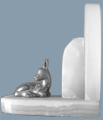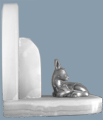 |
.............................. |
 |
| Novedades |
| Biografía |
| Biography |
| Libros en español |
| Works in English |
| Textos |
| Works |
| Fotografía |
| Photography |
| Entrevistas |
| Contacto |
Biography
...................................................................................................
Click on images
Edgar Brau was born in the Argentine city of Resistencia,  where he lived until his early adolescence.
where he lived until his early adolescence.
During his childhood years he attended classes at a Catholic school; in his free time, he practiced several sports (football, basketball, rugby, rowing), wandered in the nearby woods and rivers and, above all, visited his grandfather´s library to enjoy intense and multiple readings. His mother´s father was a Spaniard from Catalonia who had come from Buenos Aires to run the new branch of a foreign company which had been opened up on the outskirts of Resistencia.
In the evenings Brau continued his education in his father´s cinema, which changed its program every day, so that between the ages of 7 and 12 he saw an average of ten movies a week.
Reading, movies, and the contact with nature were the three pillars that sustained his cultural and spiritual development during those years.
..........................................................
By the end of the 60´s, his family moved to Buenos Aires.
After completing his third year of high school, he felt an urgent need to take up his education again (which, like Bernard Shaw, he had interrupted to attend elementary school), and quit the classroom for good.
He started to work, to go out with girls, to read lavishly. During the following three years he had more than twenty different jobs. He spent all his income on books, records, and movie tickets.
By that time he dreamed of attending classes at the National Film School in Lodz, Poland, to become a film director. One day, however, someone realized he had a talent for acting, and advised him to turn his energies to the stage. He worked in a couple of plays, with positive results, and then decided to continue. His career as actor and stage director had begun.
day, however, someone realized he had a talent for acting, and advised him to turn his energies to the stage. He worked in a couple of plays, with positive results, and then decided to continue. His career as actor and stage director had begun.
..................................................................................................
 After working with several groups, he met Hugo Marín, a brilliant but arbitrary and eccentric stage director, and an expert in Greek and Elizabethan tragedies. Brau considered (and still considers) him to be, by far, the most important Argentine stage director. It was with Marín, and with Alberto Rodríguez Muñoz, one of the founders of independent theater in Argentina, that Brau completed his training as actor and stage director.
After working with several groups, he met Hugo Marín, a brilliant but arbitrary and eccentric stage director, and an expert in Greek and Elizabethan tragedies. Brau considered (and still considers) him to be, by far, the most important Argentine stage director. It was with Marín, and with Alberto Rodríguez Muñoz, one of the founders of independent theater in Argentina, that Brau completed his training as actor and stage director.
At the beginning of the 80´s, Edgar Brau staged two different versions of A Season in Hell, by Arthur Rimbaud, in both of them playing the role of the famous French poet.
 Later on, he worked —as actor and stage director— in Damned Poets, play that he structured around poems by Baudelaire, Nerval, and Rimbaud. It was his last theatrical performance. Believing that the Argentine reality of those times was not propitious to helping him build the kind of theatrical art to which he aspired; affected by the recent death of his admired Hugo Marín; and now curious about the existential space that his first experiences in writing seemed to promise him, he gave up acting.
Later on, he worked —as actor and stage director— in Damned Poets, play that he structured around poems by Baudelaire, Nerval, and Rimbaud. It was his last theatrical performance. Believing that the Argentine reality of those times was not propitious to helping him build the kind of theatrical art to which he aspired; affected by the recent death of his admired Hugo Marín; and now curious about the existential space that his first experiences in writing seemed to promise him, he gave up acting.
...................................................................................................
 For some time Brau was a self-taught photographer and painter of icons. Later he opened a shop specializing in rare books, and in time he completed and improved his first stories.
For some time Brau was a self-taught photographer and painter of icons. Later he opened a shop specializing in rare books, and in time he completed and improved his first stories.
 The writers who frequented the shop encouraged him to publish. His first book, The Poem and Other Stories, was published in 1992. His second book, published in 1995, was a novel: The Player.
The writers who frequented the shop encouraged him to publish. His first book, The Poem and Other Stories, was published in 1992. His second book, published in 1995, was a novel: The Player.
Between that year and 2000, he published two books of poems, three short story collections, and a novel. This production includes Tres Cuentos (“Three Short Stories”), Suite argentina (“Argen-tine Suite”, four short stories based on the latest Argentine military dictatorship), and El último Viaje del capitán Lemuel Gulliver (“Captain Lemuel Gulliver´s Last Voyage”), a satire of present day society, in which he narrates an imaginary fifth voyage of Swift´s character, in this case to an unknown, rather large island located near the estuary of the Rio de la Plata, an island that Gulliver calls Incognitahriah. Due to an inexplicable phenomenon, this island is occasionally reduced to the size of a turtle, albeit with no disruption of everyday life.
...................................................................................................
By mid-2000, Edgar Brau´s complete work in prose was chosen by The National Endowment for the Arts to be translated into English by Donald A. Yates, the first North American translator and editor of Jorge Luis Borges.
Since then, Edgar Brau has been invited by various universities and American literary organizations to present his work and give courses as Visiting Professor. Together with his translator, he also offered several bilingual readings on the West Coast.
 In 2003, during one of his stays at Lake Tahoe, Nevada, he wrote Casablanca, a novella set in the 50s, in which a rich Argentine ranch owner (estanciero) builds on his estate an exact replica of the café and casino in the film of the same name, opens it to the public and manages to reproduce, by means of doubles, all the incidents in the movie. The novella was translated into English by Andrea G. Labinger.
In 2003, during one of his stays at Lake Tahoe, Nevada, he wrote Casablanca, a novella set in the 50s, in which a rich Argentine ranch owner (estanciero) builds on his estate an exact replica of the café and casino in the film of the same name, opens it to the public and manages to reproduce, by means of doubles, all the incidents in the movie. The novella was translated into English by Andrea G. Labinger.
...................................................................................................
In September 2006, a collection of his works entitled Casablanca and Other Stories was published in the States by MSU Press.
In 2007 Words Without Borders published Woodstock, a long poem Brau wrote inspired by the rock festival of the same name, which was translated into English by Michele McKay Aynesworth.
Between 2009 and 2013 he wrote and published the following works: The Golem Project (El Proyecto Golem - Metzengerstein, October 2011), a story that takes place at an unspecified future date and narrates how the Israelis manage to bring Hitler back to life with his memory intact; Faust (Fausto - Metzengerstein, December 2012), a play in which the character is now a bright Argentine biologist at Princeton, who, while considering the possibility of destroying the formula he has just discovered (which will enable man to live for a thousand years) is interrupted by the devil Mephistopheles, who has the mission of preventing that destruction; and Like Psalms (Como salmos - Metzengerstein, February 2013), twenty-six poems in which arguments with God and arguments about the existence of God build, through contradiction, a metaphysics in which the answer always seems to bring about a new question (see Novedades).
He also completed two suites of photographs-poems: A Wanderer´s Photo Album (Coghlan) and Woman in Syllables (see Photography).
In February 2014 he published Gulliver´s Craft (El oficio de Gulliver - Metzengerstein), a novel written in 2012, which modifies and enlarges —from 60 to 350 pages— his earlier story based on Swift´s character (see Novedades).
Edgar Brau lives in Argentina.
...................................................................................................



